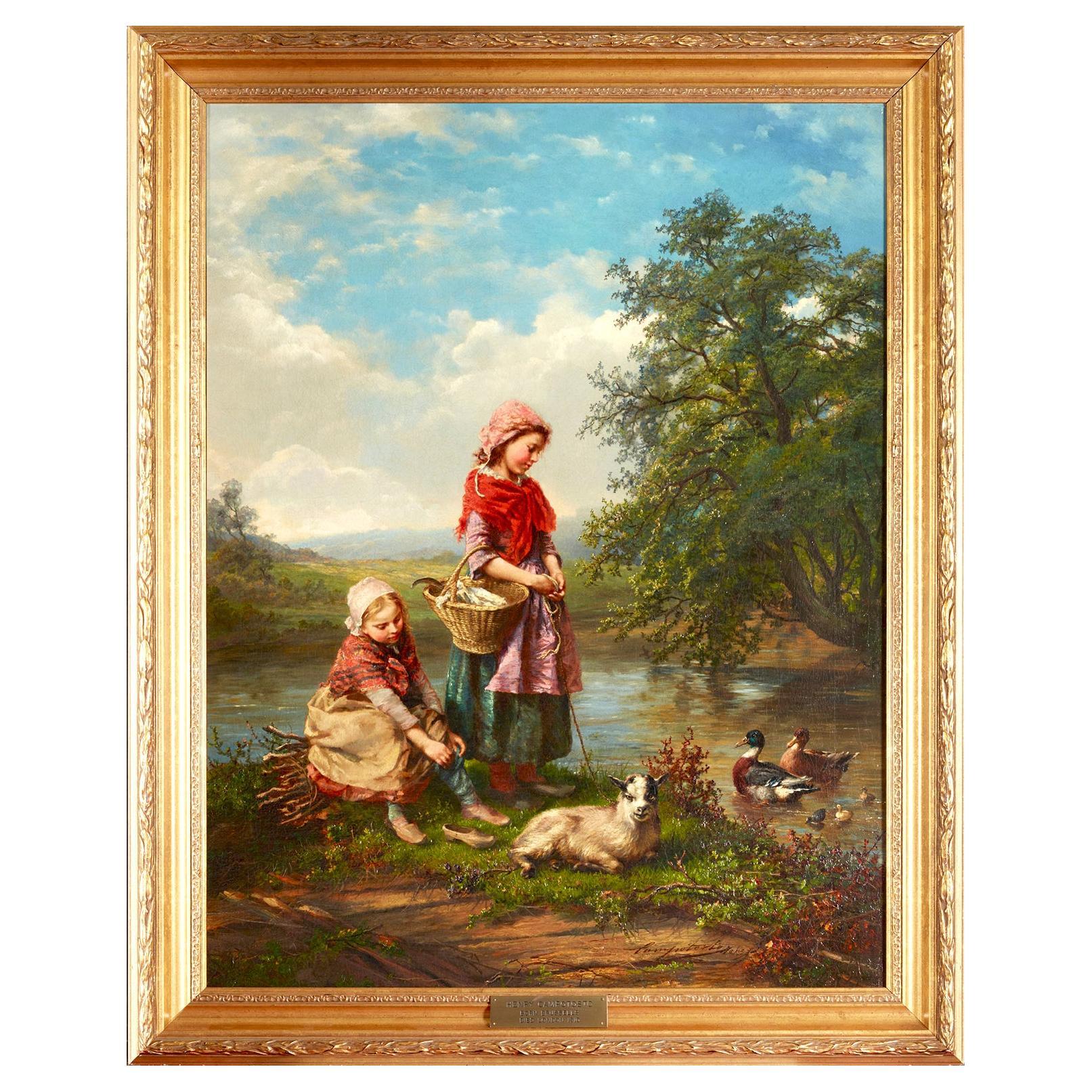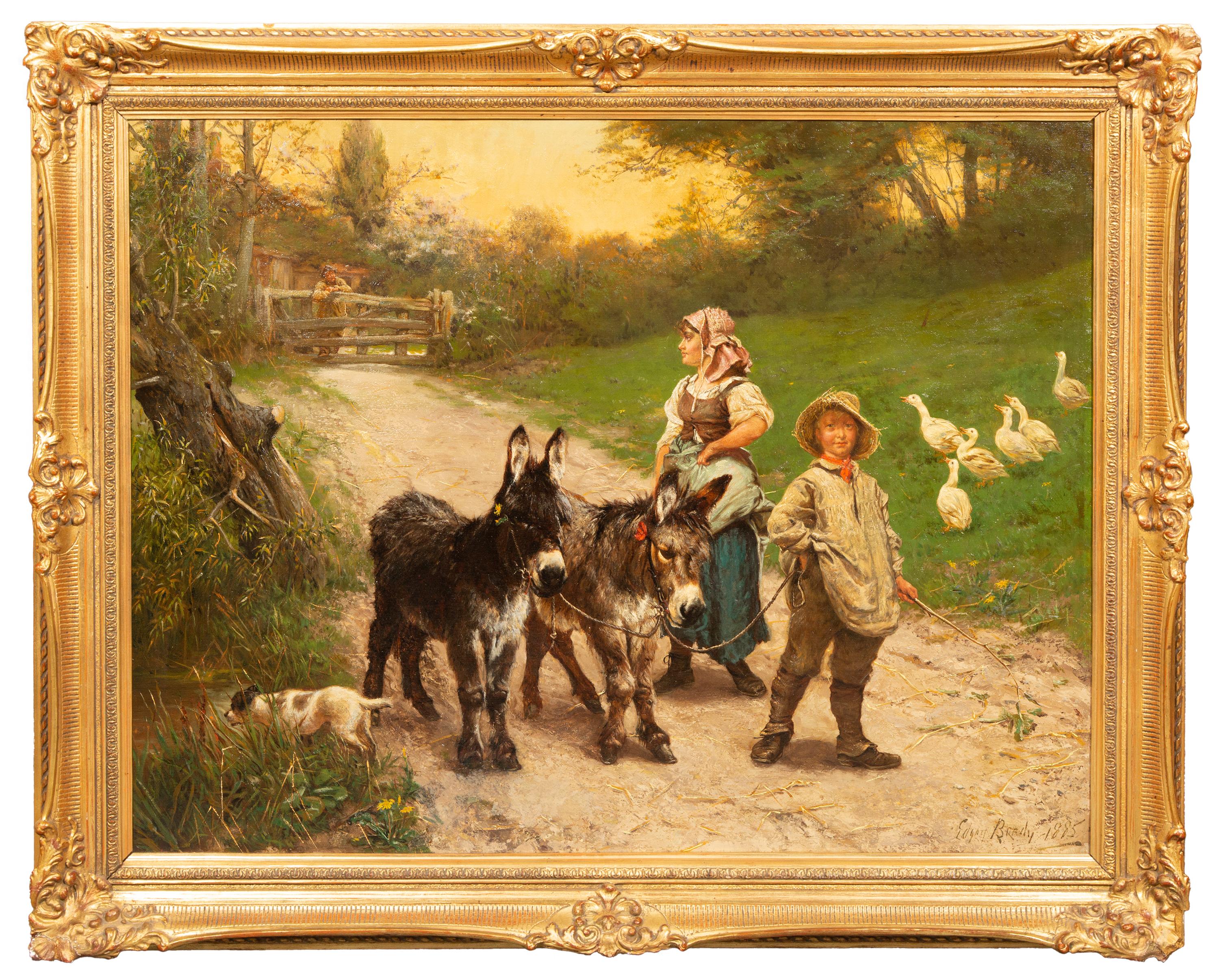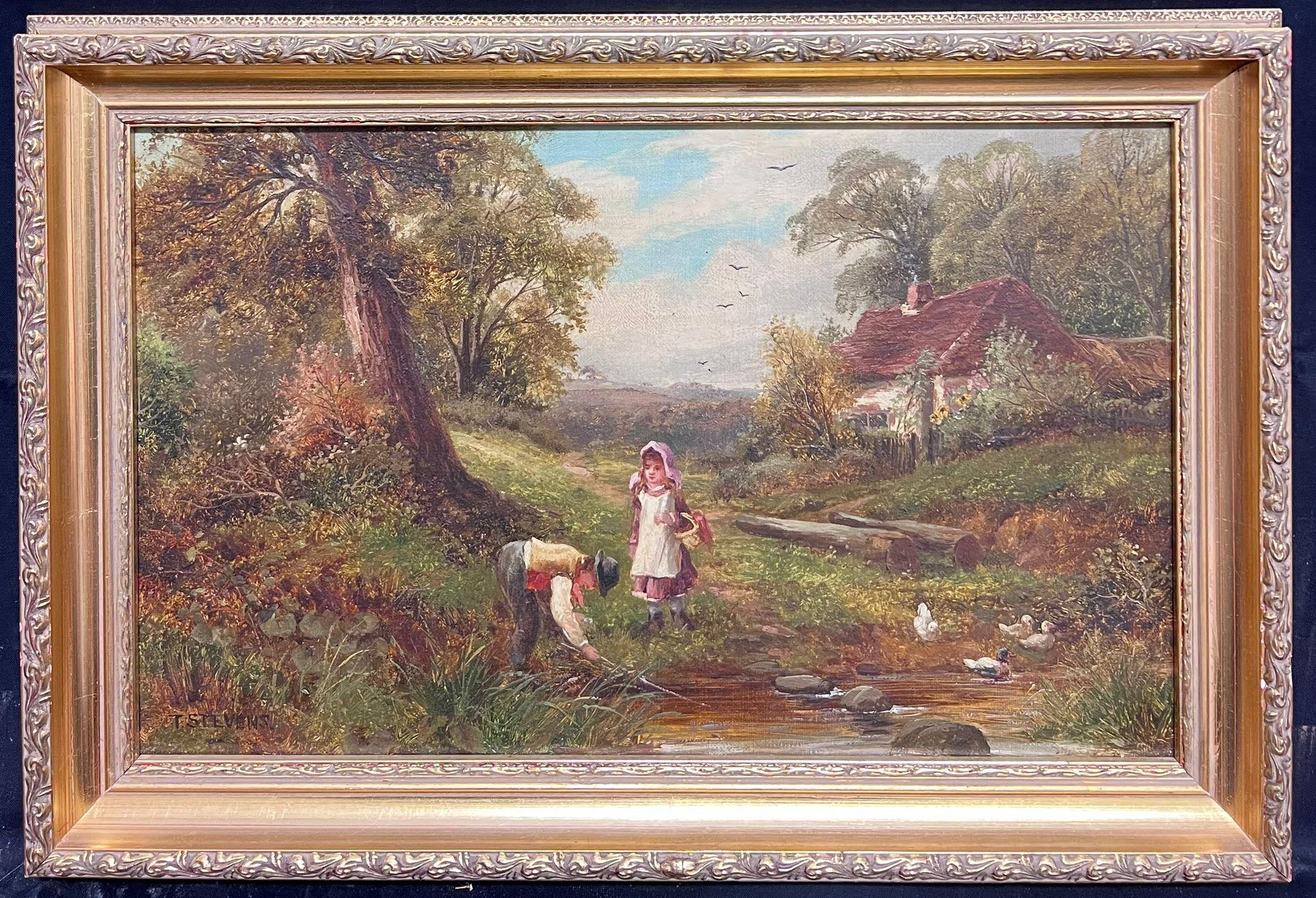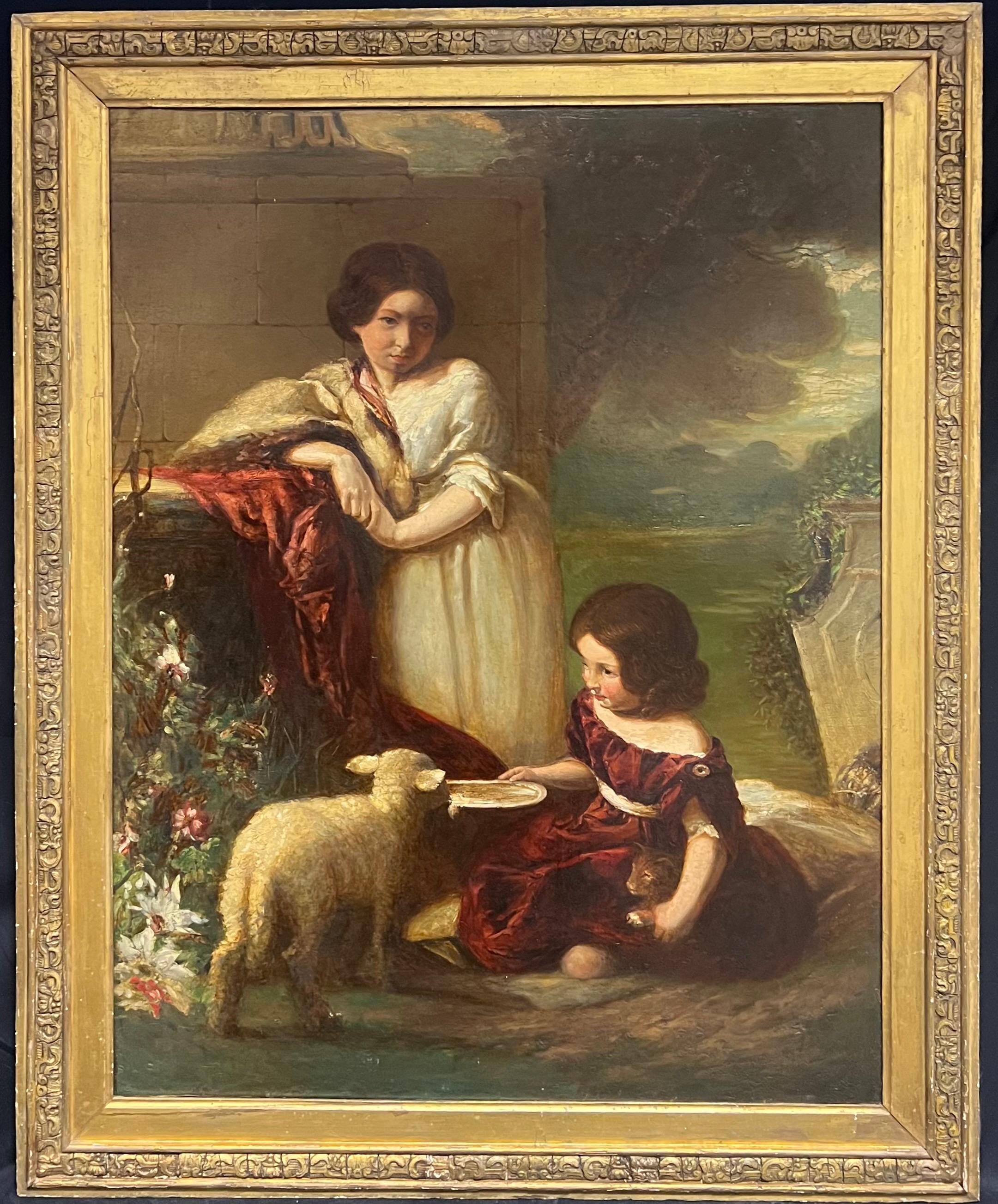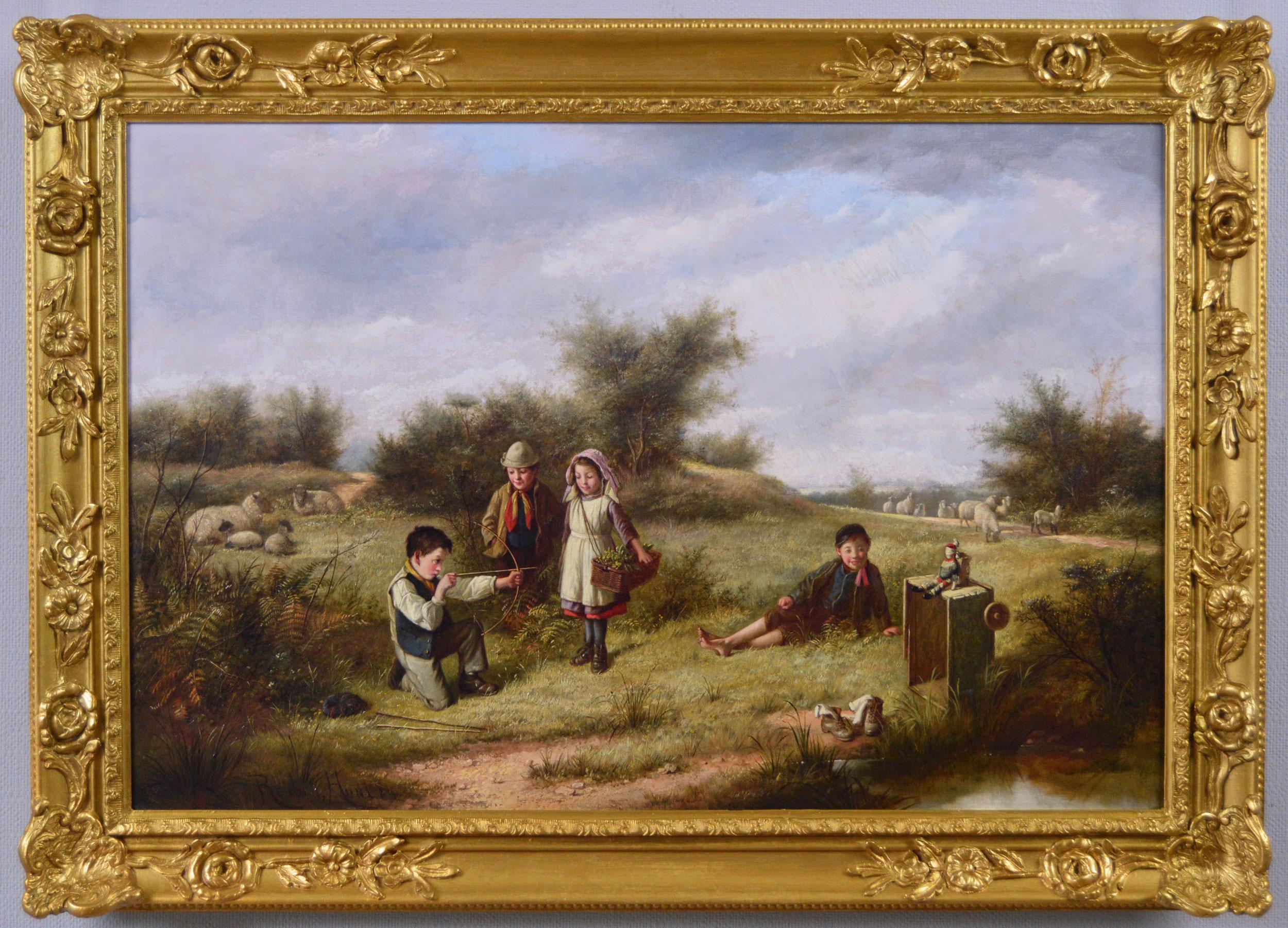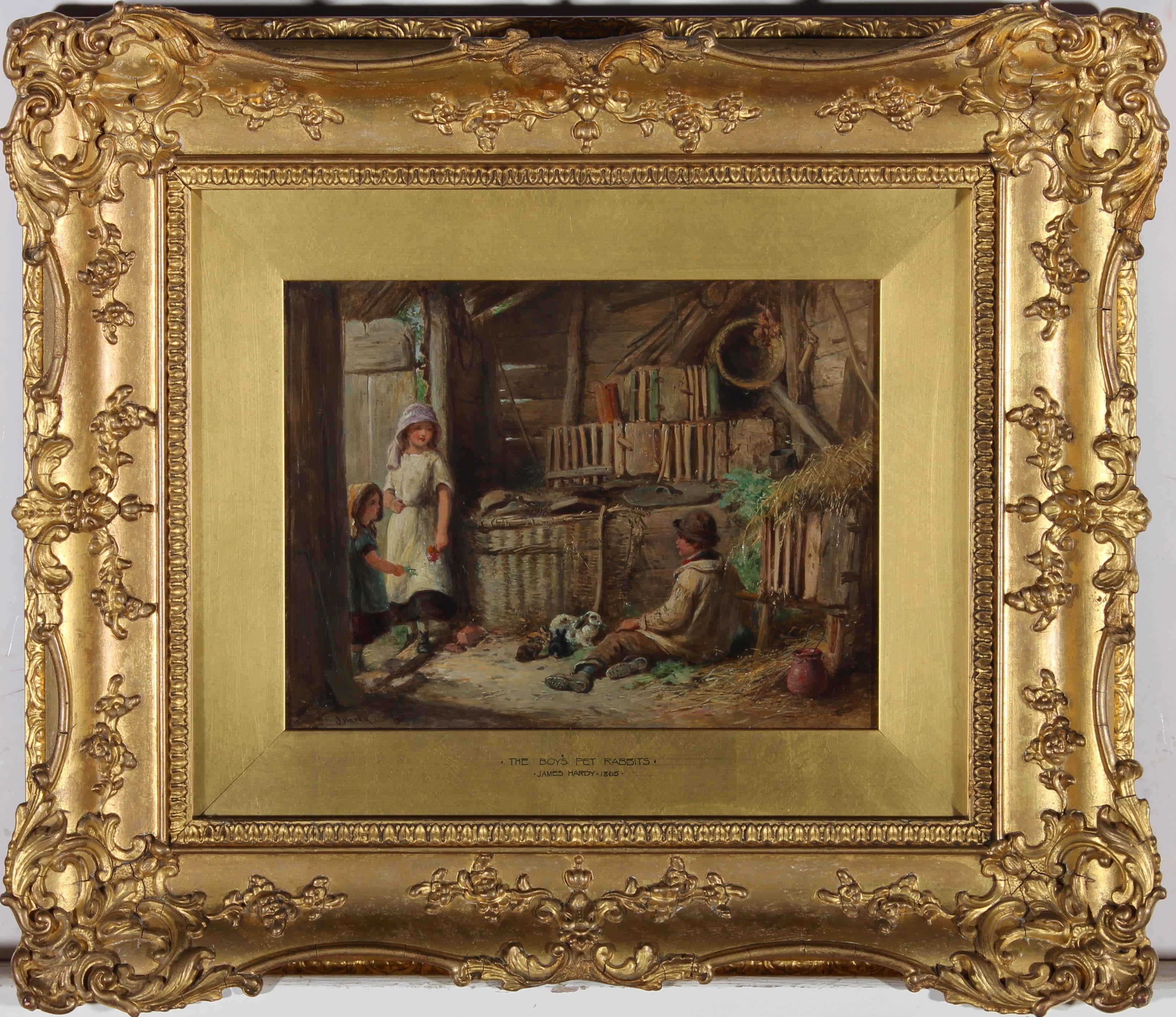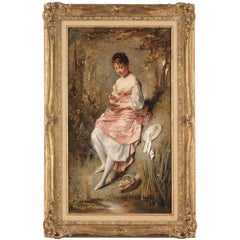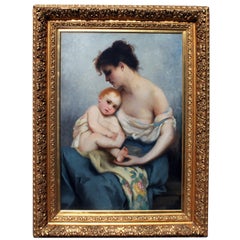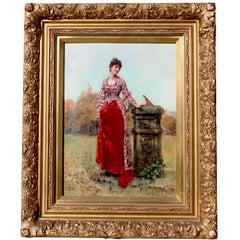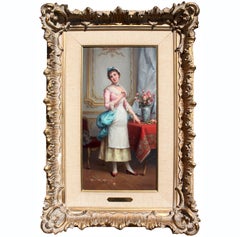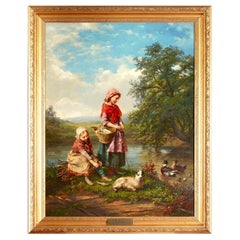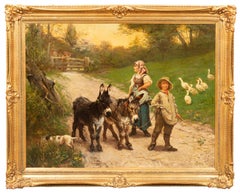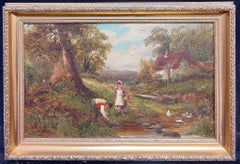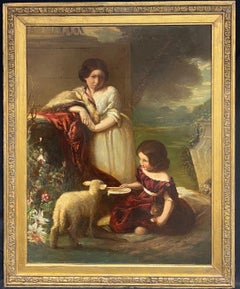Items Similar to A Fine and Charming 19th Century Oil Canvas "Children Walking the Baby Goat"
Video Loading
Want more images or videos?
Request additional images or videos from the seller
1 of 16
Henry Joseph Campotosto (Belgium, 1833-1910) A Fine and Charming 19th Century Oil Canvas "Children Walking the Baby Goat"Brussels, 1870
Brussels, 1870
$47,500
£35,739.34
€41,279.69
CA$67,129.90
A$72,846.17
CHF 38,602.05
MX$893,422.85
NOK 477,697.62
SEK 451,398.96
DKK 308,173.49
About the Item
Henry Joseph Campotosto (Belgium, 1833-1910) A Very Fine Oil on Canvas "Walking the Baby Goat", depicting two young dutch girls by the grassy shore of a river bank, one standing holding a wicker basket and a leash to a resting baby goat, the youngest sitting next to her on a pile of branches tucking her pants, a pair of ducks and ducklings swimming by the tree lined river; within a later giltwood carved frame. Signed (l/r): Campotosto Henry. Circa: Brussels, 1870.
Note: The artist is also known as Henri Campotosto
Henry or Henri Campotosto was born in Brussels in 1833. He studied in Brussels at the Royal Academy des Beaux-Arts and painted some artworks with Eugène Verboeckhoven (Belgium, 1798-1881). He received a 1st Class Medal at the Academy of Brussels and an honorable mention at the Paris Exhibition of 1860. In 1871 he moved to London with his family and remained there for life. He exhibited his work at the Royal Academy Exhibition until 1874 and at the Suffolk Street Gallery from 1878. In 1880 he took part in the Berlin Academy Exhibition. His daughter Octavia also became a painter, visited Italy, and showed her paintings at the Royal Academy from 1871 to 1874. Henri Campotosto died in London in 1910.
High Sales:
Christie's New York - Property from an American Collection, "The Bird's Nest" - Lot 247 on October 22, 2008, Sold for $37,500
Bonhams London - 19th Century European, Victorian and British Impressionist Art on 28 September 2016 - Lot 33 "Gathering flowers" Sold for £25,000 ($33,750 USD)
Museums:
The British Museum - Print of two girls and a lamb and print of two girls by a river bank
Literature
• E. Benezit Dictionnaire des Peintres, Sculpteurs, Dessinateurs, et Graveurs by Librairie Gründ - 1976 Edition - Volume 2, Page 488.
• Maurice W. Brockwell: Campotosto, Henry. In: Ulrich Thieme (Hrsg.): Allgemeines Lexikon der Bildenden Künstler von der Antike bis zur Gegenwart. Begründet von Ulrich Thieme und Felix Becker. Band 5: Brewer–Carlingen. E. A. Seemann, Leipzig 1911, S. 480
• National Exhibition of Works of Art, at Leeds, 1868. Published by the Executive Committee
Measures: Canvas Height: 34 5/8 inches (88cm)
Canvas Width: 26 3/4 inches (68 cm)
Frame Height: 39 5/8 inches (100.7 cm)
Frame Width: 31 3/4 inches (80.7 cm)
Frame Depth: 2 1/4 inches (5.8 cm)
- Creator:Henry Joseph Campotosto (Belgium, 1833-1910) (1833 - 1910, Belgian)
- Creation Year:Brussels, 1870
- Dimensions:Height: 39.63 in (100.67 cm)Width: 31.75 in (80.65 cm)Depth: 2.25 in (5.72 cm)
- Medium:
- Movement & Style:
- Period:
- Condition:Re-lined, some re-touching to craquelure in the sky - some work to cheek and arm of standing girl and to seated girl's hand - otherwise in largely good condition.Wear consistent with age and use. Minor losses. Minor fading. A truly beautiful artwork4.
- Gallery Location:LA, CA
- Reference Number:Seller: Ref.: A2667 - Lot 114491stDibs: LU2755214684482
About the Seller
No Reviews Yet
Vetted Professional Seller
Every seller passes strict standards for authenticity and reliability
1stDibs seller since 2024
- ShippingRetrieving quote...Shipping from: LA, CA
- Return Policy
Authenticity Guarantee
In the unlikely event there’s an issue with an item’s authenticity, contact us within 1 year for a full refund. DetailsMoney-Back Guarantee
If your item is not as described, is damaged in transit, or does not arrive, contact us within 7 days for a full refund. Details24-Hour Cancellation
You have a 24-hour grace period in which to reconsider your purchase, with no questions asked.Vetted Professional Sellers
Our world-class sellers must adhere to strict standards for service and quality, maintaining the integrity of our listings.Price-Match Guarantee
If you find that a seller listed the same item for a lower price elsewhere, we’ll match it.Trusted Global Delivery
Our best-in-class carrier network provides specialized shipping options worldwide, including custom delivery.More From This Seller
View AllA Fine French 19th Century Oil on Canvas 'A Young Girl Holding a Bird's Nest'
By Charles Joshua Chaplin
Located in LA, CA
Charles Joshua Chaplin (French, 1825-1891) 'The Bird's Nest' A very fine and charming Rococo revival style oil on canvas depicting a young girl, dressed in 18th century costume and resting by a river bank, holding a bird's nest and one of the tiny eggs. Her bonnet resting to her side and a wicker basket full of hand-picked flowers by her feet; within a later giltwood carved frame. Signed: ChChaplin (lower left). Circa: 1870-1880.
Canvas Height: 31 1/2 inches (80 cm)
Canvas Width: 17 15/16 inches (45.5 cm)
Frame Height: 38 5/8 inches (98 cm)
Frame Width: 24 3/4 inches (63 cm)
Frame Depth: 2 3/8 inches (6 cm)
Charles Joshua Chaplin (8 June 1825 – 30 January 1891) was a French painter and printmaker who painted both landscapes and portraits. He worked in techniques such as pastels, lithography, watercolor, chalk, oil painting and etching. He was best known for his elegant portraits of young women.
Chaplin was born on 8 June 1825 in Les Andelys, Eure, France. His mother, Olympia Adelle Moisy, was French, whereas his father, John Chaplin, was an art broker from England. Charles Chaplin spent his whole life in France, becoming a naturalized citizen in 1886. He studied at the École des Beaux-Arts in Paris from 1840, and he took private lessons in the studio of Michel Martin Drolling, whose apprentices included Paul Baudry, Jules Breton and Jean-Jacques Henner. Later he also taught at the École des Beaux-Arts.
In 1845, he entered the Paris Salon, the official art exhibition of the Académie des Beaux-Arts, as a portrait and landscape painter with the painting Portrait of the Artist's Mother. Chaplin conducted art classes specifically for women at his studio, including Marie Joséphine Nicolas. The American artist Mary Cassatt, the French artist Louise Abbéma and the English artist Louise Jopling were among Chaplin's students. His son Arthur Chaplin was also a painter.
Early Work:
Chaplin made his debut at the Salon with portraits, but he also painted landscapes, particularly the countryside of Auvergne. His early works, from 1848 to 1851, were painted in a manner characterized by an interest in realism, a style established in the French Second Republic, that had the motto Liberté, égalité, fraternité, and was ruled for three years by the republican government of France from the 1848 Revolution until the 1851 coup by Louis-Napoléon Bonaparte. Realism was an artistic movement that began in France in the 1850s, after the 1848 Revolution. From the late 18th century Romanticism dominated French art and literature but was spurned by Realists, who revolted against the display of the emotions of the Romantic movement, seeking to depict real and characteristic contemporary individuals and situations with truth and accuracy.
Chaplin painted many works in his early days, including floral studies that were displayed at the Salon de las Flores. Later, in the late 1850s, he abandoned naturalism, his earlier style, exchanging it for a more graceful, elegant and supple technique that brought him a certain notoriety in France during his time as a portrait painter; as such he embraced the idyllic and voluptuous and fashionable style of the prominent French painter, François Boucher (1703–1770).
He also embraced the tradition of the great English portraitists and developed his very own style of painting but was inspired by the British painters Joshua Reynolds and Thomas Gainsborough. He used to engrave the works of the Dutch artist Pieter Paul Rubens and gained further influence from his work.
Later Work:
Gradually the muddy colours used by Chaplin transformed into white, grey and pink, depicting his models with an opalescent, mother-of-pearl complexion by applying a subtle palette of rosy flesh tones and light greys. After painting portraits and trying his skills on ornamental painting, Chaplin took up genre painting in the 1850s. His favourite subjects are the feminine grace of a young woman's everyday life. He portrays women in several poses: resting; grooming; singing; and reading. He captures them with lightness and carelessness and accentuates the decorative elements of the composition.
Empress Eugénie, the wife of Napoleon III and an admirer of the "Pompadour style", rapidly fell under the enchantment of the painter's neo-Rococo works. Chaplin was among Napoleon III and Empress Eugénie's favourite court artists. In 1859, when his portrait of Aurora was banned by the judges of the Salon as "too erotically suggestive", Napoléon III defended Chaplin and overturned the disqualification order. He was similarly valued as an interior decorator and was appointed to remodel the decor of Empress Eugénie's rooms.
His sensual portraits of women and young girls, often with models posed erotically in hazy surroundings and frequently wearing transparent clothing, attracted the interest of the high society and aristocracy of Paris during the French Third Republic (1870–1940) guaranteeing his success and wealth. He was one of the most popular painters of his time, but nowadays his work is almost unknown, in spite of the fact that his works hang in many major museums around the world.
He employed his Rococo style for his mythological scenes and genre scenes paintings. His genre pictures formed a significant part of his work. In 1861, working as a decorative painter. Chaplin painted the doors and several glass panels above them of the Salon des Fleurs in the Tuileries Palace. The Palace was gutted by fire in 1871 and its ruins swiftly demolished.[9] He also undertook decorating work in the Salon de l’Hémicycle of the Palais de l’Elysée.
Honours and awards:
As a member of the Académie royale de peinture et de sculpture, Chaplin exhibited his paintings at the Paris Salon, the official exhibition venue of members' work. He began exhibiting his paintings at the French Artists' Salon in 1845 and was represented there habitually each year. These exhibitions made him one of France's most famous portrait artists. Commencing in 1847, his work was exhibited regularly at the Royal Academy in London.
During his lifetime, he received acclamation for his artistic talents by the award of several medals: a third class medal in 1851; a second class medal the following year; and an Honour Medal...
Category
19th Century Academic Figurative Paintings
Materials
Oil
A Fine and Charming 19th Century Victorian Oil on Canvas "Mother and Child"
Located in LA, CA
Attributed to Charles Edward Hallé (British, 1846-1914) "Mother and Child" oil on canvas. The Victorian era artwork depicting a young mother holding her joyful infant child, within a...
Category
Late 19th Century Portrait Paintings
Materials
Oil
A Fine Victorian Oil on Board Titled "A Lady Standing by a Sundial in the Park"
By Henry John Yeend King
Located in LA, CA
Henry John Yeend King R.B.A, R.I., R.O.I. (British, 1855-1924) "A Victorian Lady Standing by a Sundial in the Park" Oil on panel. Signed lower right: Yeend King. "YK" Sticker en ver...
Category
Late 19th Century Academic Figurative Paintings
Materials
Oil
A Fine French 19th Century Oil on Board "A Standing Beauty with Spring Roses"
Located in LA, CA
A very fine French 19th century oil on board titled "A Standing Beauty with Spring Roses" by Charles Baptiste Schreiber (French, 1845-1903)...
Category
Late 19th Century Academic Figurative Paintings
Materials
Wood, Oil
Georges-Marie-Julien Girardo (French 1856-1914) Oil on Canvas "A Wedding Party"
Located in LA, CA
Georges-Marie-Julien Girardot (French, b. Besançon 1856 - d. Paris, 1914) "Avant le mariage" (Before the Wedding) A Palatial and Impressive French 19th Century Oil on Canvas depictin...
Category
19th Century Academic Figurative Paintings
Materials
Oil
A Fine & Large 19th Century Oil on Canvas "New Year's Day at The Grandfather's"
Located in LA, CA
Friedrich Ortlieb (German, 1839-1909) A fine and large oil on canvas titled "New Year's Day at The grandfather's". The joyful indoor family scene depicting a Christmas and new year's...
Category
19th Century Academic Figurative Paintings
Materials
Oil
You May Also Like
Henry Joseph Campotosto, Oil Canvas "Walking the Baby Goat"
Located in Los Angeles, CA
Henry Joseph Campotosto (Belgium, 1833-1910) A Very Fine Oil on Canvas "Walking the Baby Goat", depicting two young dutch girls by the grassy shore of a river bank, one standing holding a wicker basket and a leash to a resting baby goat, the youngest sitting next to her on a pile of branches tucking her pants, a pair of ducks and ducklings swimming by the tree lined river; within a later giltwood carved frame. Signed (l/r): Campotosto Henry. Circa: Brussels, 1870.
Note: The artist is also known as Henri Campotosto
Henry or Henri Campotosto was born in Brussels in 1833. He studied in Brussels at the Royal Academy des Beaux-Arts and painted some artworks with Eugène Verboeckhoven (Belgium, 1798-1881). He received a 1st Class Medal at the Academy of Brussels and an honorable mention at the Paris Exhibition of 1860. In 1871 he moved to London with his family and remained there for life. He exhibited his work at the Royal Academy Exhibition until 1874 and at the Suffolk Street Gallery from 1878. In 1880 he took part in the Berlin Academy Exhibition. His daughter Octavia also became a painter, visited Italy, and showed her paintings at the Royal Academy from 1871 to 1874. Henri Campotosto died in London in 1910.
High Sales:
Christie's New York - Property from an American Collection, "The Bird's Nest" - Lot 247 on October 22, 2008, Sold for $37,500
Bonhams London - 19th Century European, Victorian and British Impressionist Art on 28 September 2016 - Lot 33 "Gathering flowers" Sold for £25,000 ($33,750 USD)
Museums:
The British Museum - Print of two girls and a lamb and print of two girls by a river bank
Literature
• E. Benezit Dictionnaire des Peintres, Sculpteurs, Dessinateurs, et Graveurs by Librairie Gründ - 1976 Edition - Volume 2, Page 488.
• Maurice W...
Category
Antique 19th Century Belgian Country Paintings
Materials
Canvas, Giltwood
‘Peasant Children walking the Donkeys’ by Edgar Bundy (1862 – 1922), dated 1885
Located in Knokke, BE
Edgar Bundy
Brighton 1862 – 1922 London
British Painter
‘Peasant Children walking the Donkeys’
Signature: signed lower right and dated ‘Edgar Bundy 1885'
Medium: oil on canvas
Dim...
Category
Late 19th Century Romantic Animal Paintings
Materials
Canvas, Oil
19th Century Country Children Playing by a Stream Victorian English Painting
Located in Cirencester, Gloucestershire
Children at the Stream
By T. Stevens, British 19th century
Signed, oil painting on canvas, framed
Framed: 12.75 x 19 inches
canvas: 10 x 16 inches
Condition: The painting is in very ...
Category
Late 19th Century Victorian Landscape Paintings
Materials
Oil
Victorian Pastoral Scene Children with Pet Lamb & Cat 19th-Century Large Oil
Located in Cirencester, Gloucestershire
Feeding the Lamb
by William Underhill ( 1808-1908) British
signed and dated 1847
Inscribed on a label verso ' Granny ( Clementine Cooper) feeding th...
Category
19th Century Victorian Figurative Paintings
Materials
Oil
19th Century genre oil painting of children playing
Located in Nr Broadway, Worcestershire
Reuben Hunt
British, (1857-1938)
Taking Aim
Oil on canvas, signed & dated (18)84
Image size: 19.5 inches x 29.5 inches
Size including frame: 25.25 inches ...
Category
19th Century Victorian Figurative Paintings
Materials
Canvas, Oil
James Hardy Junior (1832–1889) - 1865 Oil, The Boy's Pet Rabbits
Located in Corsham, GB
Am exquisite example of the work of the Victorian genre scene painter, Thomas Hardy Junior. The scene shows a barn interior, with a young boy seated on the hay strewn floor, with his pet rabbits. Two little girls...
Category
Mid-19th Century Figurative Paintings
Materials
Oil
$2,468 Sale Price
20% Off
More Ways To Browse
Antique Bird Nest
Victorian Oil Painting Of Flowers
Painting 19th Century Belgian
L Henry
Maurice Henry
1911 Antiques
19th Century Girl And Lamb
Coffee Cup Painting
Cream Of Wheat
Dutch Boy
Evgeniy Monahov
Impasto Portrait
Jewish Art Framed
Jewish Oil Canvas
Lawyer Art
Liu Xiaodong
Michael Propper
North African Art Paintings
